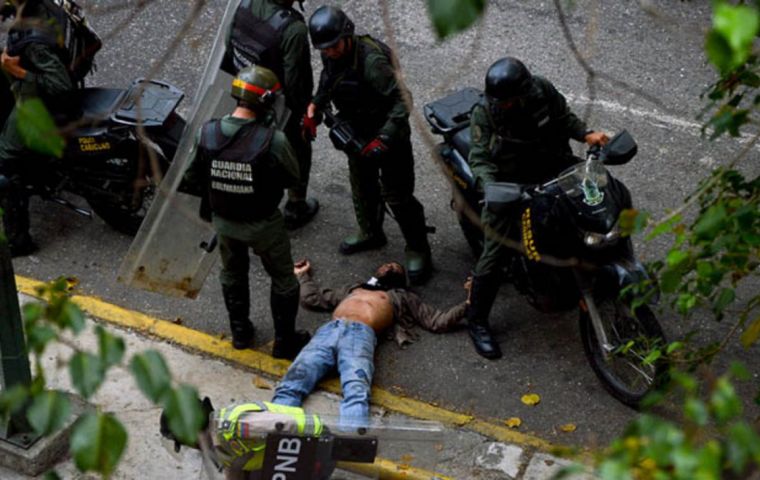MercoPress. South Atlantic News Agency
UN report slams Venezuela government for methodical extrajudicial executions, forced disappearances and torture
 The Mission believes Venezuelan authorities and security forces have since 2014 planned and executed serious human rights violations
The Mission believes Venezuelan authorities and security forces have since 2014 planned and executed serious human rights violations The Venezuelan government was accused of committing crimes against humanity in a report published on Wednesday by a United Nations-backed fact-finding mission.
After investigating 223 cases of alleged extrajudicial executions, enforced disappearances, arbitrary detentions and torture, and reviewing an additional 2,891 to corroborate patterns of violations and crimes, the UN Independent International Fact-Finding Mission on the Bolivarian Republic of Venezuela found that the Venezuelan government, as well as other state agents and groups working with them, had committed “egregious violations.”
“The Mission found reasonable grounds to believe that Venezuelan authorities and security forces have since 2014 planned and executed serious human rights violations, some of which -- including arbitrary killings and the systematic use of torture -- amount to crimes against humanity,” said Marta Valiñas, chairperson of the UN mission.
“Far from being isolated acts, these crimes were coordinated and committed pursuant to State policies, with the knowledge or direct support of commanding officers and senior government officials.”
The 411-page report is the first published by the UN mission. Commissioned by the UN Human Rights Council, it includes 48 in-depth case studies and expands on the extrajudicial executions, politically motivated detentions and torture, as well as protest-related violence.
Venezuelan Foreign Minister Jorge Arreaza has repeatedly criticized the UN Human Rights Council and the UN High Commissioner for Human Rights (OHCHR) as “biased.”
The report singles out two Venezuelan security forces as being responsible for nearly two-thirds of all extrajudicial killings -- the Scientific, Criminal and Criminological Investigator Corps (CICPC) and the Special Action Forces (FAES) of the National Bolivarian Police (PNB).
Dressed in black uniforms and sometimes wearing Halloween-style masks, they show up in large numbers in some of Venezuela's poorest neighborhoods -- the barrios -- and target young men seemingly at random.
According to the UN report, superiors would grant FAES officers a “green light to kill” and a FAES training video authenticated by the UN mission shows officers being encouraged to “kill criminals without compassion.” Officials with the PNB/FAES also told the UN mission that it was common practice to cover up killings by planting weapons to simulate “confrontations” -- a process officers referred to as planting “seeds.”
“High-ranking officials had effective command and control over the perpetrators and knowledge of their actions but failed to prevent or repress the violations,” said Marta Valiñas. “The killings appear part of a policy to eliminate unwanted members of society under the cover of combating crime.”
In addition to extrajudicial killings, the UN mission also investigated politically motivated repression and torture allegedly by Venezuelan intelligence agencies, namely the Bolivarian National Intelligence Service (SEBIN) and the General Directorate of Military Counter-Intelligence (DGCIM). The UN mission found that while SEBIN targeted political dissidents, human rights activists, and others perceived to be against the government, the DGCIM targeted military personnel and associated civilians allegedly involved in rebellions or coup attempts.




Top Comments
Disclaimer & comment rulesCommenting for this story is now closed.
If you have a Facebook account, become a fan and comment on our Facebook Page!